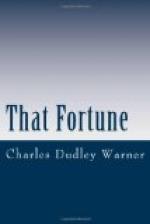Mr. Brad was in the story stage of his evolution as a writer. His light facility in it had its attraction for Philip, but down deep in his nature he felt and the impression was deepened by watching the career of several bright young men and women on the press—that indulgence in it would result in such intellectual dishonesty as to destroy the power of producing fiction that should be true to life. He was so impressed by the ability and manifold accomplishments of Mr. Brad that he thought it a pity for him to travel that road, and one day he asked him why he did not go in for literature.
“Literature!” exclaimed Mr. Brad, with some irritation; “I starved on literature for a year. Who does live on it, till he gets beyond the necessity of depending on it? There is a lot of humbug talked about it. You can’t do anything till you get your name up. Some day I will make a hit, and everybody will ask, ‘Who is this daring, clever Olin Brad?’ Then I can get readers for anything I choose to write. Look at Champ Lawson. He can’t write correct English, he never will, he uses picturesque words in a connection that makes you doubt if he knows what they mean. But he did a dare-devil thing picturesquely, and now the publishers are at his feet. When I met him the other day he affected to be bored with so much attention, and wished he had stuck to the livery-stable. He began at seventeen by reporting a runaway from the point of view of the hostler.”
“Well,” said Philip, “isn’t it quite in the line of the new movement that we should have an introspective hostler, who perhaps obeys Sir Philip Sidney’s advice, ‘Look into your heart and write’? I chanced the other night in a company of the unconventional and illuminated, the ‘poster’ set in literature and art, wild-eyed and anaemic young women and intensely languid, ‘nil admirari’ young men, the most advanced products of the studios and of journalism. It was a very interesting conclave. Its declared motto was, ‘We don’t read, we write.’ And the members were on a constant strain to say something brilliant, epigrammatic, original. The person who produced the most outre sentiment was called ‘strong.’ The women especially liked no writing that was not ‘strong.’ The strongest man in the company, and adored by the women, was the poet-artist Courci Cleves, who always seems to have walked straight out of a fashion-plate, much deferred to in this set, which affects to defer to nothing, and a thing of beauty in the theatre lobbies. Mr. Cleves gained much applause for his well-considered wish that all that has been written in the world, all books and libraries, could be destroyed, so as to give a chance to the new men and the fresh ideas of the new era.”




